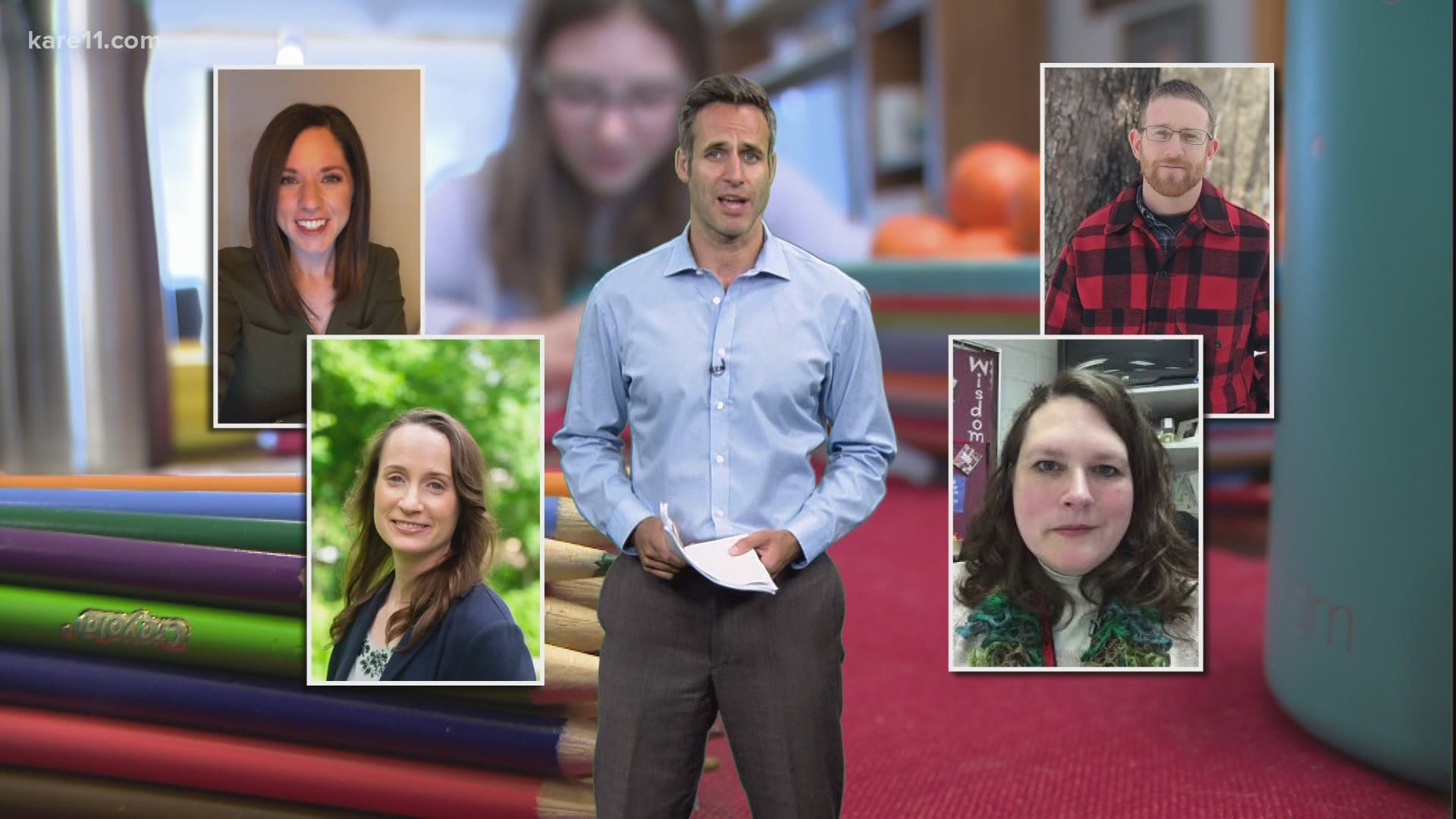MINNEAPOLIS — Distance and hybrid learning.
Two education methods students and parents are going to have to learn to adapt to, as the coronavirus pandemic continues.
KARE 11 received many questions and concerns about how the new teaching methods going to work this fall. So Kris Laudien sat down with four teachers to get their opinions on the upcoming school semester.
Maya Kruger, St. Anthony Middle School
Ryan Larsen, Pine City High School
Megan Hall, Open World Learning Community in St. Paul
Rachel Baumann, a Special Education Teacher at Farmington High.
One question that kept finding its way to our inbox, what are the biggest challenges?
Maya Kruger: When I think of all the hurdles, I think the number 1 is mindset. For a lot of us, we don’t want to be doing distance, we don’t want to be doing hybrid, we’ve got this inner resistance to it and once we can switch our mindset from I don’t want to do this to how can I make this the best possible experience I can then I think that will help us get over some of those other hurdles. Having that positive I can do this, I can figure it out mindset is going to be pivotal to helping everyone have success; students, teachers, families.
Megan Hall: I think the biggest challenge is orientation and navigation. So, it’s really challenging for kids to get a clear picture of their to-do list and when they are going through school they just show up in a class and the teacher tells them and hopefully they write it down in a planner or something like that but when they’ve got however many courses in a learning management system and they have to click through to try to find things, that’s when I think the headaches start.
Ryan Larsen: For students that tend to be in more challenging and more vulnerable situations not having the consistency of school can be tough because school is a lot more than just a place to go to class, it’s where they see friends, in the winter-time it’s warm, there’s good food there. So, not being in school, I think for a lot of students, a lot of kids in rural areas, can feel pretty isolating.
Many parents wonder how are students and teachers are going to get to know each other?
Rachel Baumann: It’s all about the relationships you have with students, that’s what’s really going to make the hybrid model, in my opinion successful, is that when you have buy in from the students and they have buy in from you it just makes it so much easier to not only give them the content they need but also to be able to help them with all of those intangible portions of learning as well.”
Maya Kruger: For me building a relationship with students over a digital platform looks like calling them or emailing them check-ins or sending them an email with a funny meme or article that made me think of them. It’s having conversations outside of the time I’m supposed to be with them.
Verna hit us up on Twitter wondering if there will be any positives to come out of this fall semester?
Ryan Larsen: It kind of gets back to that idea of problem solving. If something isn’t working, what are you going to do to fix that, what are you going to do to make it better. In a lot of ways, it forces you to be more creative and forces you to have to dig a little bit deeper to make things happen.”
Maya Kruger: It’s forcing us as teachers to boil down our curricula to what really matters. To think about what skills or content is going to embolden or impassion or equip our students to become healthy, happy, successful adults instead of just what we are used to teaching. It also gives students a chance to build some of these independent skills that sometimes we pass over in the classroom.
Megan Hall: What can I do to make my classroom more comforting, more comfortable so that kids that really struggle to succeed when they are with me in person, when they come back, they have a better experience.
The most asked question, what advice can you share with parents?
Ryan Larsen: I think a lot of parents found it challenging just to help their child stay engaged and to dig in and do the work. I think one of the big things that is important for parents to recognize is if it’s not working, be in contact with the teachers. I had some parents that couldn’t find things or didn’t know how things would work and usually with a text or an email we could get to the bottom of things pretty quickly.
Maya Kruger: My greatest piece of advice is to limit decision making. Decision making is so stressful and it’s way easier to make the instantly gratifying choice than it is to make a smart one. So, what we can do as families or even students is to limit the amount of decisions that you have to make and create situations and circumstances where the smart choice is the easy choice.
Megan Hall: I think it’s really challenging when as parents we also try to be the educator at the same time. Educators challenge us and push us and make us angry because they push us out of our comfort zone and a parent is kind of the opposite, the parent is the comfort zone. So, step one is figure out what the heck my kid has to do to get his classwork done and then step two is believe in him and be that warm, kind presence.

